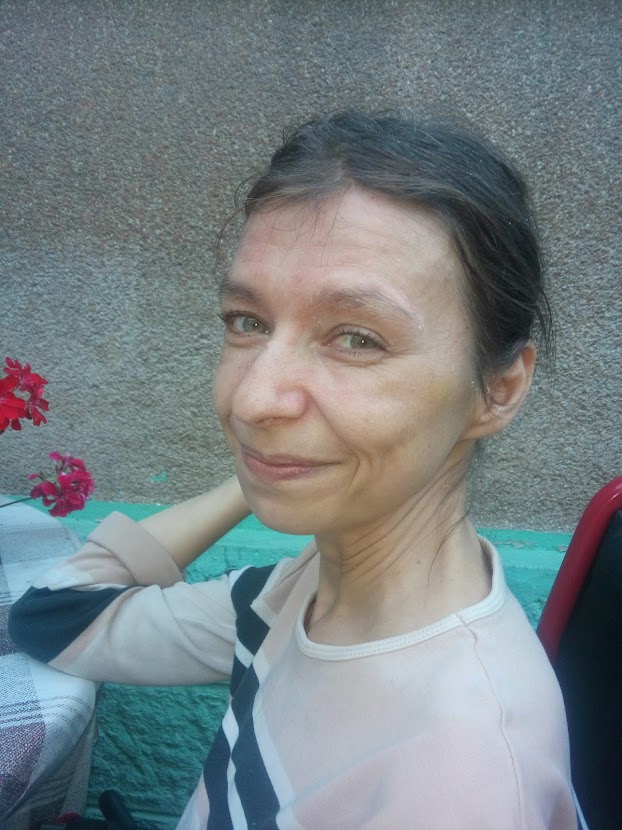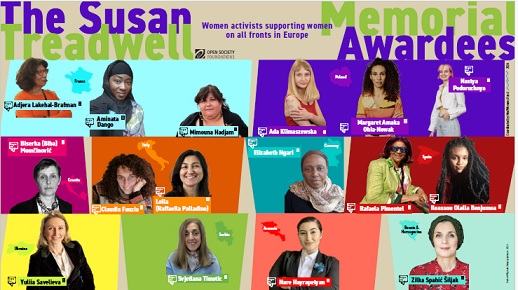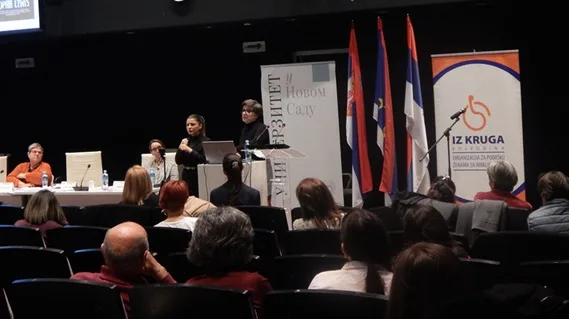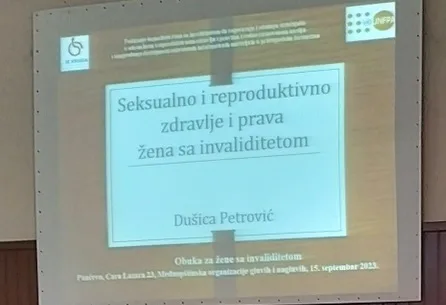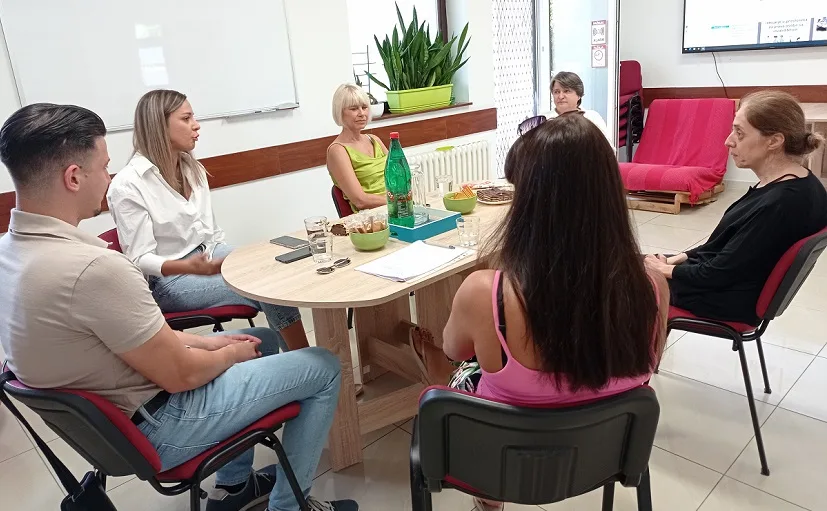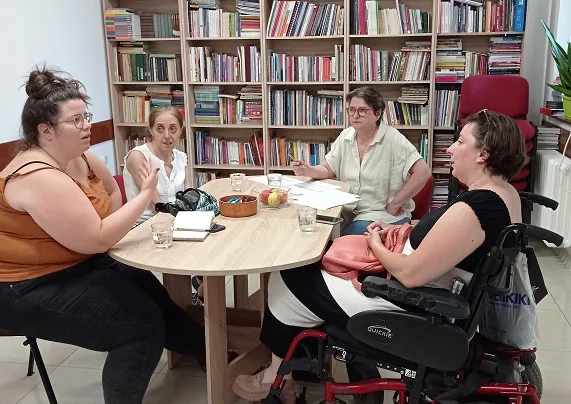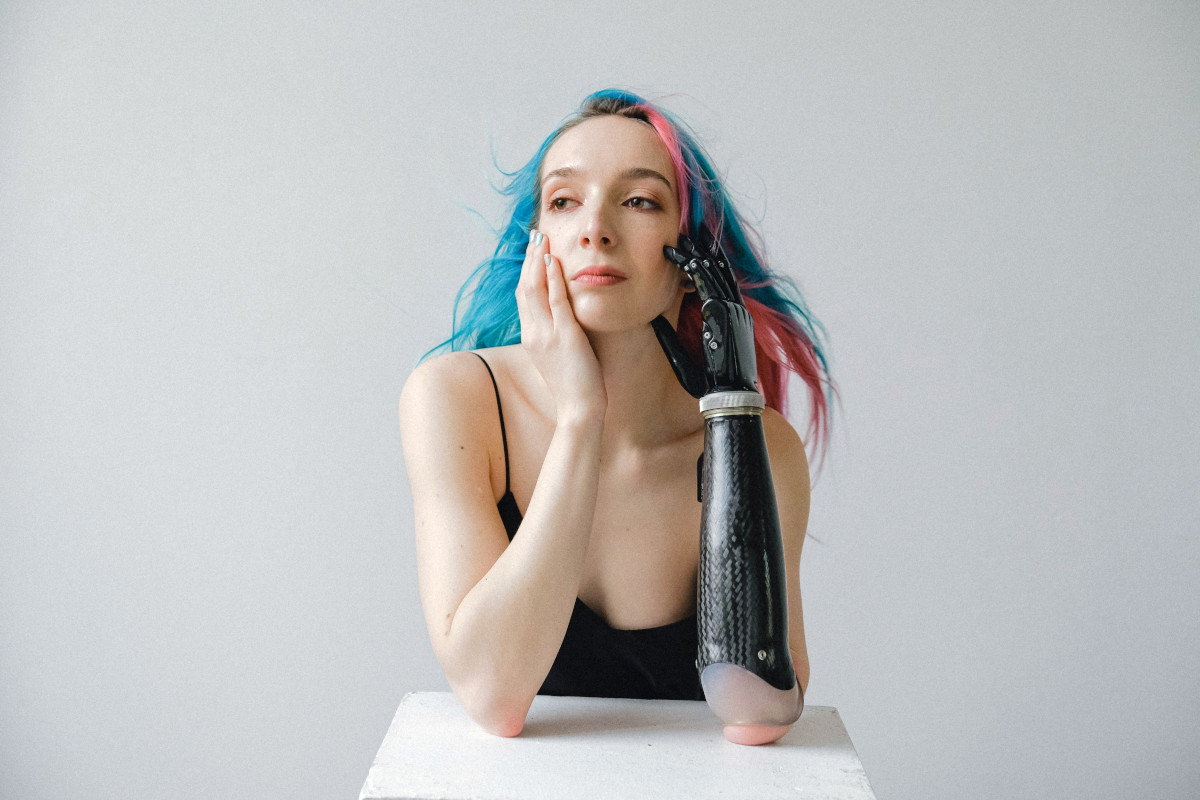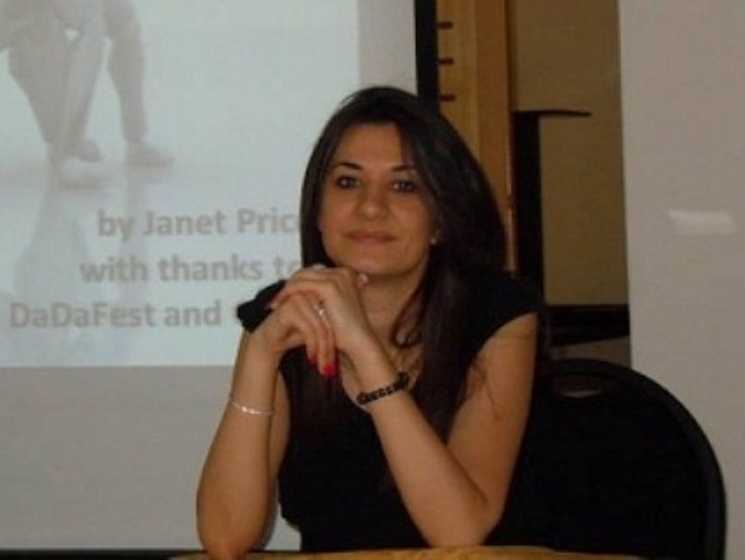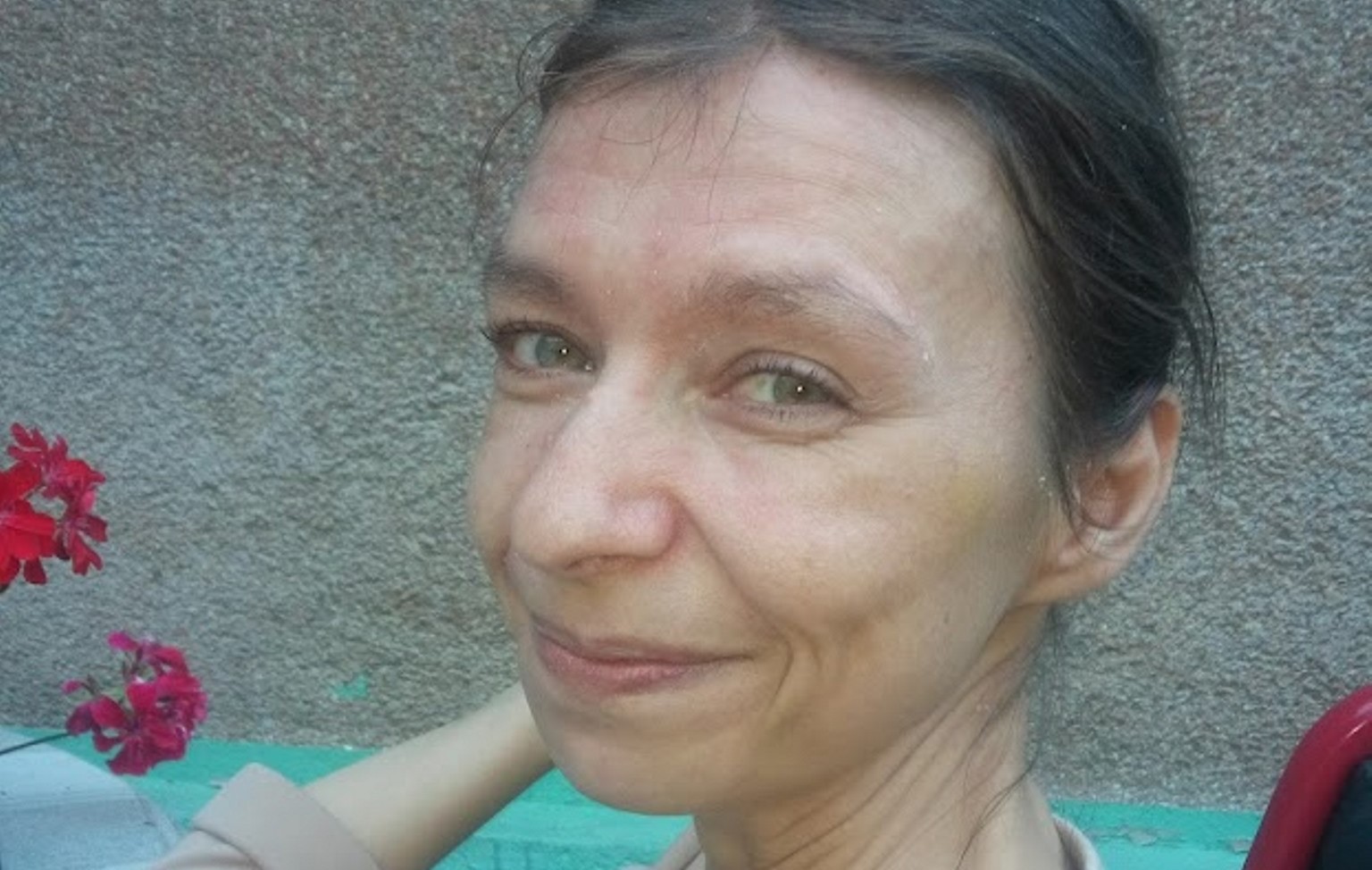Dragana Dragicevic (41) from Bor is a Mechanical Engineer who works in web programming and design. Alongside the interest in new technologies and computers, Dragana is an activist and a president of the association IZ KRUGA – Bor. She is a single mother.
– I try to promote the rights of persons with disabilities in my surroundings – she says for Disability Portal. – To encourage them to live actively and on self-advocacy. A lot has changed;
we networked with numerous institutions competent for exercising our rights, but still, I cannot reach many persons with disabilities that need our support because they live in isolation.
Dragana’s journey to activism and advocacy for oneself and others didn’t go easy. To become a voice that advocates and empowers others, firstly, she needed to find a way out of the isolation and violent partnership in which she lived for a few years by herself.
– Because of my experience, I decided to be of help to other women to get out of violence. Associations are a significant link in the support chain, but there were no such associations in Bor, only traditional ones with no particular influence. I made up my mind to be one – says Dragana.
We talked to Dragana about her life story, healing processes and empowerment, how she became herself again, and how she managed to transform a traumatic experience into a source of strength from which she gives support to other women who survived or are surviving violence.
What is activism, in your opinion?
– For me, activism means involvement in social life. Everyone should be active; life cannot be reduced to passivity. In order for something to change in the lives of people with disabilities, we have to set ourselves in motion. The public doesn’t know enough about us and cannot accordingly have an understanding of our challenges. If we don’t express our needs ourselves, nothing will change. As long as disabled people are locked in their homes, nothing can be done. We have the same rights legally, but it is often not such in reality. Activism is a process that leads to equalization. I am positive that almost every person with a disability experiences some violence: denying the right to movement and social contacts, withdrawal of information, withdrawal of economic means – I testified to these myself many times. On occasions when I went to see some persons with disabilities on behalf of the association, the relative would forbid it. Isolation is a type of violence. The problem is that a person living in violence may not be aware of it, has no information, no support network, and normalizes what is happening to them.
Do you notice that as a disabled woman, you are exposed to microaggressions?
– I never considered myself different. I’ve noticed that men avoid me; it’s like that today, and it will always be like that, but I see myself as regular. My nuclear family always excepted me; I went to a regular school and did not differ in any way from my peers. I socialized, went out, and went on school trips; nothing was troublesome. Even today, everyone that meets me gets a different picture of people with disabilities. But to give someone a chance to know me, I have to go out. That is why I advocate for accessibility, personal assistance, mobility rights, and independence, for an inclusive society instead of life in isolation. Not many people can sway me nowadays, but doctors used to be truly cruel and inconsiderate. I remember, in high school, a neurologist told me: – You are finished. You cannot work, and over time you will get worse. Roughly, his message was: – Sit down and wait to die. That kind of behavior should be punishable by law. I couldn’t care less about incoherent comments and am neglectful of nonsense. If I were annoyed about everything one could say, I would have died as soon as I was born. I take nothing for granted. I can look for information on my own and make my conclusions.
From your experience, what are the most common misconceptions about women who survive or have survived violence?
– Women are not trusted. Our society always implies that woman needs to endure. Misapprehension is omnipresent. Intimidators often show one face in public, another at home. People believe in what they see and accept pretense. If a neighbor or an acquaintance notices or hears what is happening within four walls, they usually do not want to report violence. It is what happened to me too. The neighbors knew but did not want to confront. When I reported violence, they came to say that they did not want to testify. It’s a delusion that violence is a private matter.
How much has the experience of violence changed you? Does that experience, in a way, divide your life before and after? In two Draganas?
– I realized I don’t need men for anything. I didn’t comprehend what was happening to me for a long time; I trusted it was normal. Thinking of my marriage nowadays, I remember only violence, like nothing good and favorable existed between us. I am an entirely different person now; I took a stand, not letting anyone hurt me. If anything bothers me, I stop it in the very beginning. I don’t put up with anyone’s nonsense. That is an essential change. To reach that stadium, a person has to be independent. I am self-supporting and can take care of myself, which bothers people. Even my father is bothered by it. There are people who, for some reason, want to be in control, wish I was dependent on them, to be the only ones in our lives. Violence is a matter of control and power.
How did you manage to get out of a violent partnership, and what obstacles did you have to overcome to start independent life?
– It is complex: if a woman with a disability relies on her partner’s support in daily functioning and a partner is violent, finding a way out is strenuous. If society took care of enabling persons with disabilities to independent living, if it dealt with the problem systematically, we wouldn’t have been in the dependent osition of the bullies. It was my situation, and because of it, I couldn’t see the exit for a long time; I didn’t know what to do. My husband was always with me and never went anywhere alone; I couldn’t do anything without him knowing about it. He had complete control and insight into what I was doing – whether I was texting someone or talking on the phone. I used to text while he was asleep and delete messages immediately. Finally, I confided to my parents and brother, and they reported, and competent institutions reacted. After everything had finished, my health decayed. I weighed 34 kg and had lung issues; it took me a long time to heal. My mother and grandmother moved in with me. I could sleep peacefully and eat properly, but my body needed three years to recover. Bringing everything else to normal was easier. I had my mother’s support and kept in contact with the organization IZ KRUGA –
BEOGRAD.
How did professionals from the institutions treat you?
– When it was all happening, everything was as it should be. They reacted professionally and managed to take me away from my husband to enable me to tell my story. A social worker came first, and we separated into another room to talk in private. She asked if he had been violent. – If he is, simply nod – that is how she said, and I nodded. Then she started talking about something else, so my husband wouldn’t doubt why she was there. She invited us to The Social Welfare Center for an interview. My husband refused at first, but somehow we went together with my parents. They singled me out again there to be alone with social workers. I remember sitting there for hours contemplating whether to tell them or not. Finally, I asked them if my daughter would stay with me. When they said that she would, I told them everything. They called the police, which took him away, and I didn’t see him for three months while he was in custody. A lawsuit was filed for violence and for divorce. I saw him at hearings, which I found really arduous. He claimed he hadn’t hurt me and looked for witnesses to collaborate his statement. His witnesses ended up testifying on my behalf. I won the case. Since he had no previous misdemeanors, he was punished lightly, a year of house arrest. House arrest means nothing.
Why was it important to you to share your experience openly via media?
I wanted the other women to hear my story, so they could react and find an exit. Our stories must be heard, we shouldn’t be silent about violence, and the truth shouldn’t be covered up. In that manner, women encourage each other. When one finds the way out, the other sees it could be possible for her. That is why I found it significant to share my story. I am open and have no problem answering any question because there is nothing I should be ashamed of; I know I am not guilty of anything. A journalist writing about such stories should present them realistically. They should write about women with disabilities like any other woman. Following those media reports, women that survived or are still surviving similar situations contacted me. They still do since my experience can empower them. I support them to be independent, to rebuild themselves and their lives because there is always a way out.
What helped you the most in terms of psychological empowerment and rebuilding self-confidence?
– The support of my mother and the fact that my daughter is living with me were of the utmost help. Personal assistance soon came to life; I was given an assistant, which was all I needed. I realized how proud I was to be a mother, proud to be financially independent, to be active and motivated to move others. Before long, I engaged in activism and registered an association, wishful to make a change. I used to live in Belgrade for a long time, so I knew what could be started and realized considering the rights of persons with disabilities, and I knew how little of those were applied in Bor. It is what I want to change. I wish support services to improve and for persons with disabilities to come out of their houses into active life in the community.
Do you feel safe nowadays?
– I do. I live with my brother and his wife, my daughter, and my grandma; my mother passed away. I feel safe in my family and my wider surroundings too. I maintain contact with my ex-husband because of the child since he has the right to see her. After the divorce, he neither threatened nor endangered me in any way. He might have cottoned on to certain things.
What would today’s you like that 80-year-old Dragana don’t forget?
– I would like to remember how I walked through life, to know how I reached everything I have today, and how I became to be what I am. To know I am living for myself.
Photo: Dragana Dragicevic’s private archive
The interview was created within the project „Improving the safety of women in Serbia“, which is implemented by the United Nations Entity for Gender Equality and Empowerment of Women in Serbia (UN Women), with the support of the Norwegian Embassy in Belgrade. The views in the interview belong exclusively to the editors of the Disability Portal and do not necessarily represent the views of UN Women and the Norwegian Embassy.

Translated by: Suzana Belos
